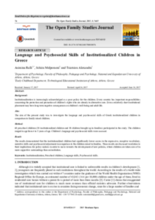Displaying 341 - 350 of 771
This report presents the findings from a secondary analysis of data from a comprehensive intervention in three baby homes in St. Petersburg, Russian Federation. The analysis examined whether caregiver-child interaction quality, number of caregiver transitions, and group size mediated the impact of intervention on children's attachment behaviors and physical growth.
This study investigated the language and psychosocial skills of pre-school aged Greek institutionalized children in comparison to Greek children of the same age raised in a family environment.
This study presents the findings from a secondary analysis of data collected in 1999, which focused on child abuse and neglect within long-term residential centers in Romania, from a child rights perspective.
This chapter serves as an introduction to the book Child Maltreatment in Residential Care and provides a brief overview of the research on child maltreatment within the context of institutional care.
This chapter of Child Maltreatment in Residential Care describes Interaction Competencies with Children – for Caregivers (ICC-C), a preventative intervention approach to improve the quality of care and reduce the incidence of maltreatment within institutional care settings in Sub-Saharan Africa.
This study investigated the correlation between the self-reported academic achievement of Romanian institutionalized children living in long-term residential care and numerous variables related to their experiences in institutional care.
The 24 chapters of this book contain research examining the institutionalization of children, child abuse and neglect in residential care, and interventions preventing and responding to violence against children living in out-of-home care settings around the world.
This paper provides evidence-based guidance on the use of family interventions involving children with a history of institutionalization prior to their placement in family-based care through foster care, adoption, or reunification with their families.
This chapter from Child Maltreatment in Residential Care presents the key findings from the Bucharest Early Intervention Project (2003), a longitudinal randomized control study which revealed the immense developmental impact of the severe deprivation experienced by children placed in institutional care shortly after birth.
This study observed the physical growth and cognitive development in institutionalized toddlers in India, finding profound developmental delays in the sample group.

